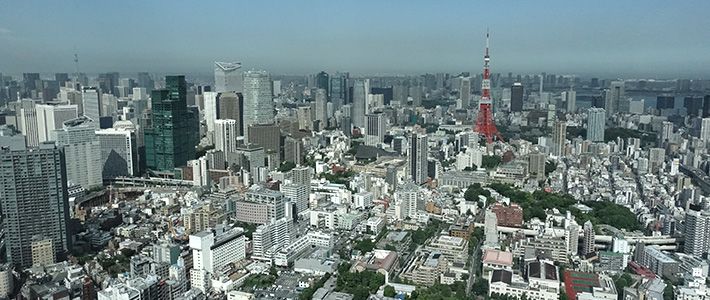
Tokyo Holds Steady at Fourth in World Ranking
Economy Society Culture- English
- 日本語
- 简体字
- 繁體字
- Français
- Español
- العربية
- Русский
On October 9, the Mori Memorial Foundation released its Global Power City Index, an annual ranking of 40 of the world’s top metropolises. The 2014 report saw the top four positions remain unchanged from the previous year, with London leading, followed by New York, Paris, and then Tokyo at fourth. The Japanese capital has remained in the number-four position for seven consecutive years, starting in 2008 with the inaugural publication of the survey.
The GPCI evaluates cities utilizing 70 indicators in the six categories of economy, research and development, cultural interaction, livability, environment, and accessibility. Comprehensive totals are then used to rank 40 cities. In addition to the standard six categories, the 2014 survey also featured the trial inclusion of specific elements appealing to human senses, such as the efficiency, hospitality, accuracy and speed, and safety and security of cities.
Asian Cities on the Rise
The 2014 survey saw the scores of several top Asian cities strengthen. Singapore and Seoul remained fifth and sixth, respectively, with both cities increasing their overall scores and narrowing the gap with number four Tokyo. Hong Kong moved up two places from 2013, breaking into the top 10 at number nine.
Tokyo made gains in the area of cultural interaction, with the city moving up from eighth to sixth. The sharp increase in foreign visitors to Japan in 2013 is one of the dynamics pointed to as contributing factors, highlighting the progress the city is making in a category where it has customarily lagged.
When intangible elements appealing to human senses were considered in the expanded survey, referred to as the GPCI+, Tokyo saw its comprehensive rank jump to third. The city received particularly high marks in such categories as a sense of safety in public places, kindness of residents, punctuality of international airports, and ease of transportation. Tokyo’s high level of public safety and hospitality and the reliability of its transportation network were seen as important factors in the higher ranking.
Tokyo’s score was helped along by the 6.8 million foreign visitors the city received in 2013, as well as factors ranging from the numbers of international conventions held and guest rooms at luxury hotels to access to World Heritage sites. Two aspects that weakened Tokyo’s score were the city’s market attractiveness and traffic convenience.
Olympics Set to Boost the Capital
Tokyo is already undertaking measures to raise its overall ranking by addressing weak areas as part of preparations for the 2020 Olympic and Paralympic Games. These efforts are expected to boost the city’s comprehensive score and could potentially propel the metropolis past Paris into third place.
Dean and professor at Meiji University’s Graduate School of Governance Studies Ichikawa Hiroo, who helped compile the survey, points to the potential of the Olympics to boost a city’s ranking. “London used the Olympics to improve in areas where it was lagging,” says Ichikawa. “This allowed it to overtake New York as first in 2012. By the time the Olympics are held in 2020, Tokyo will have an increased number of quality hotels and even more inbound foreign tourists. I expect these and other factors will lift the city past Paris into third and allow the Japanese capital to narrow the gap with New York at second place.”
The situation for the other two Japanese cities in this year’s survey was not so encouraging, with Osaka slipping from the previous year’s 23 to 26 and Fukuoka falling one notch to 36.
GPCI Influencing City Planning
The 2014 ranking marks the seventh publication of the GPCI. Takenaka Heizō, chairman of the Mori Memorial Foundation’s Institute for Urban Strategies, points to the index’s growing influence. “Globalization has forced cities to be more competitive,” says Takenaka. “Up to now, rankings have focused on individual factors, such as financial strength and disaster preparedness, but none has considered cities as a whole. This is why the GPCI is becoming not just a leading comprehensive index for ranking cities, but a real global standard.” Takenaka has called on national and local governments to use the GPCI as a guide in forging new policies that reflect urban trends around the globe.
Global Power City Index 2014
| Rank | City (previous rank) | Comprehensive score |
|---|---|---|
| 1 | London (1) | 1,485.8 |
| 2 | New York (2) | 1,362.8 |
| 3 | Paris (3) | 1,292.4 |
| 4 | Tokyo (4) | 1,276.1 |
| 5 | Singapore (5) | 1,138.6 |
| 6 | Seoul (6) | 1,117.8 |
| 7 | Amsterdam (7) | 1,055.5 |
| 8 | Berlin (8) | 1,054.9 |
| 9 | Hong Kong (11) | 1,012.8 |
| 10 | Vienna (9) | 1,004.3 |
| 26 | Osaka (23) | 872.5 |
| 36 | Fukuoka (35) | 747.4 |
Note: Tokyo, Osaka, and Fukuoka were the only Japanese cities included in the survey.
(Originally written in Japanese on October 9, 2014.)